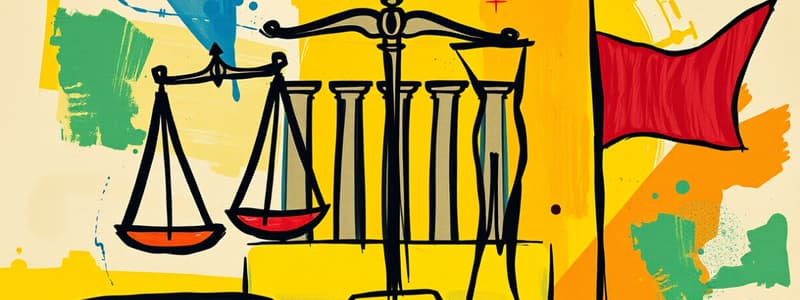Podcast
Questions and Answers
What is the primary function of the adversarial system?
What is the primary function of the adversarial system?
- To ensure that the outcome is always in favor of the defendant
- To eliminate the role of judges in legal decisions
- To allow the government to control legal disputes
- To provide a neutral platform for parties to advocate opposing positions (correct)
What distinguishes a bench trial from other types of trials?
What distinguishes a bench trial from other types of trials?
- It involves a jury making the final decision
- Witnesses are not allowed to testify
- It is only used for civil cases
- The judge alone acts as the fact-finder (correct)
Which of the following best describes civil liberties?
Which of the following best describes civil liberties?
- Rights granted only to citizens of a country
- Rights that can be revoked by the government at any time
- Individual rights protected from government infringement (correct)
- Provisions mainly designed for corporate entities
How does the Exclusionary Rule impact criminal trials?
How does the Exclusionary Rule impact criminal trials?
Which statement about the Fifth Amendment is true?
Which statement about the Fifth Amendment is true?
What does 'due process' ensure for defendants in criminal law?
What does 'due process' ensure for defendants in criminal law?
What does 'discretion' refer to in the context of the criminal justice system?
What does 'discretion' refer to in the context of the criminal justice system?
In terms of justice, what is the difference between equality and equity?
In terms of justice, what is the difference between equality and equity?
What role does the corrections system play in society?
What role does the corrections system play in society?
What characterizes the definition of a crime?
What characterizes the definition of a crime?
What is the primary role of a finder of fact in a legal proceeding?
What is the primary role of a finder of fact in a legal proceeding?
Which amendment to the U.S. Constitution guarantees due process rights?
Which amendment to the U.S. Constitution guarantees due process rights?
In the context of individual rights, what is primarily protected?
In the context of individual rights, what is primarily protected?
Which term best defines 'Just Deserts' in legal terms?
Which term best defines 'Just Deserts' in legal terms?
What does 'Rule of Law' emphasize in a legal system?
What does 'Rule of Law' emphasize in a legal system?
What is the term for the law of retaliation in legal doctrine?
What is the term for the law of retaliation in legal doctrine?
Which of the following best describes the role of a prosecutor?
Which of the following best describes the role of a prosecutor?
How would you define probation in the criminal justice system?
How would you define probation in the criminal justice system?
What distinguishes a jail from a prison?
What distinguishes a jail from a prison?
What is the primary function of a sheriff?
What is the primary function of a sheriff?
Flashcards are hidden until you start studying
Study Notes
Legal System Concepts
- Adversarial System: A common law framework where opposing parties advocate their positions, and a neutral judge or jury determines the outcome.
- Bench Trial: Trial format without a jury, where the judge acts as the sole fact-finder.
Constitutional Foundations
- Bill of Rights: Comprises the first ten Amendments to the U.S. Constitution, safeguarding fundamental individual rights.
- Due Process Clause: Protection against arbitrary denial of life, liberty, or property; included in the Fifth and Fourteenth Amendments.
Rights and Liberties
- Civil Liberties: Rights protected from government infringement, allowing individual freedoms.
- Individual Rights: Freedom to pursue personal goals without government interference.
Criminal Justice System
- Corrections: Methods and institutions, including prisons and probation, used to manage criminal offenders.
- Criminal Justice System: Agencies and processes established to prevent crime and punish law violations.
Legal Roles and Proceedings
- Defendant: Individual or organization being accused in civil or criminal cases.
- Defense Counsel: Attorney specializing in the defense of the accused.
- Prosecutor: Attorney representing the state in prosecuting criminal cases.
- Judge: Official with authority to make legal decisions in court.
Legal Principles
- Equality: Standard of treating all individuals the same under the law.
- Equity: Concept of giving individuals what they rightly deserve based on circumstances.
Judicial Evidence and Fairness
- Exclusionary Rule: Evidence obtained in violation of a defendant’s rights cannot be used in court.
- Due Process: The guarantee of fair and impartial legal proceedings.
Judicial Entities and Processes
- Court: Government entity resolving legal disputes.
- Jury: Group of citizens tasked with evaluating evidence and delivering verdicts.
Detainment and Supervision
- Incarceration: The act of imprisoning individuals for crimes.
- Jail: Facility for individuals accused or convicted of minor offenses.
- Prison: Institution for persons convicted of severe crimes.
- Probation: Alternative to imprisonment, allowing supervision in the community with conditions.
- Parole: Early release from prison with supervision and compliance to specific conditions.
Justice Philosophies
- Retributive Justice: Focus on punishing offenders as a form of justice rather than rehabilitation.
- Lex Talionis: Law of retaliation, emphasizing proportional punishment.
Law Enforcement
- Police: Civil authorities responsible for crime prevention and public safety.
- Sheriff: Chief law enforcement officer at the county level, originating from feudal systems.
- Sheriff's Deputies: Officers working under the sheriff's authority.
Legal Concepts
- Finder of Fact: Either a judge or jury responsible for establishing the facts in a legal case.
- Rule of Law: Governance by established laws, separating governmental authority from personal discretion.
- Procedural Justice: Concept synonymous with due process, emphasizing fairness in legal processes.
Studying That Suits You
Use AI to generate personalized quizzes and flashcards to suit your learning preferences.




